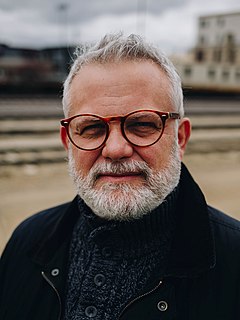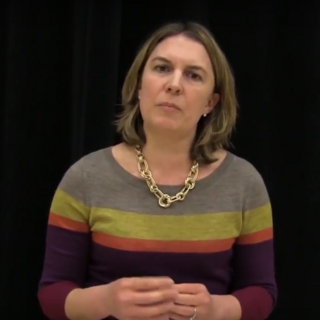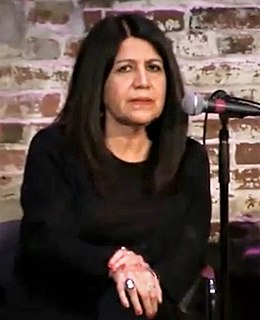
Paula Vogel is an American playwright who received the 1998 Pulitzer Prize for Drama for her play How I Learned to Drive. A longtime teacher, Vogel spent the bulk of her academic career – from 1984 to 2008 – at Brown University, where she served as Adele Kellenberg Seaver Professor in Creative Writing, oversaw its playwriting program, and helped found the Brown/Trinity Rep Consortium. From 2008 to 2012, Vogel was Eugene O'Neill Professor of Playwriting and department chair at the Yale School of Drama, as well as playwright in residence at the Yale Repertory Theatre.

Roberto Aguirre-Sacasa is an American playwright, screenwriter, and comic book writer best known for his work for Marvel Comics and for the television series Glee, Big Love, Riverdale and Chilling Adventures of Sabrina. He is Chief Creative Officer of Archie Comics.

Quiara Alegría Hudes is an American playwright, producer, lyricist and essayist. She is best known for writing the book for the musical In the Heights, and screenplay for its film adaptation. Hudes' play Elliot, A Soldier's Fugue was a finalist for the 2007 Pulitzer Prize for Drama; she received the 2012 Pulitzer Prize for Drama for her play Water by the Spoonful.
Kenneth Lin is an American playwright and screenwriter. Lin's plays have been performed throughout the world and his TV shows have been distributed via Netflix, HBO, Cinemax, Hulu and more. In theatre, he is best known for his plays Po Boy Tango, Farewell My Concubine, and Kleptocracy. In Television, he is best known for his work on the Netflix series House of Cards, the Hulu Series, The First, and the Cinemax series, The Warrior. He is a member of the theater/music/film collective New Neighborhood.

W. David Hancock is an American playwright, best known for his plays The Race of the Ark Tattoo and The Convention of Cartography. He is a two-time Obie winner for his works with the Foundry Theatre. His experimental, nonlinear work is known for blurring boundaries between artifice and reality, often through unconventional theatrical spaces and an object-centric dramaturgy. As the critic Elinor Fuchs writes, in Hancock’s work, “…we encounter mystery and authenticity at another level entirely.”
Bathsheba "Bash" Doran is a British-born playwright and TV scriptwriter living in New York City.
Lila Rose Kaplan is a 21st-century American playwright. She currently lives in Somerville, MA, where she was a Huntington Playwriting Fellow with the Huntington Theatre Company (2012-2014) as well as a Next Voices Playwriting Fellow with New Repertory Theatre (2015-2016).
Zinnie Harris FRSE is a British playwright, screenwriter and director currently living in Edinburgh. She has been commissioned and produced by the Royal Court Theatre, Royal National Theatre, the National Theatre of Scotland and the Royal Shakespeare Company. Her work is translated and performed in many countries.
Jennifer Haley is an American playwright. She grew up in San Antonio, Texas and studied acting at the University of Texas at Austin for her undergraduate degree. Haley also received a MFA in playwriting at Brown University in 2005, where she worked under American playwright and professor, Paula Vogel. Now living in Los Angeles, Haley is pursuing a career in theatre, film and television.

Milta Ortiz is a bilingual, bicultural playwright, poet, and performer.

Karen Zacarías is a Latina playwright who was born in Mexico in 1969. She is known for her play Mariela in the Desert. It was the winner of the National Latino Playwriting Award and a finalist for other prizes. Mariela in the Desert was debuted at the Goodman Theatre in Chicago. Zacarías is the founder of the Young Playwrights' Theater located in Washington, D.C.
Christopher Oscar Peña is a playwright, screenwriter, actor and educator who resides in New York City. He teaches theater at NYU's Tisch School of Arts and is a member of the Playwrights Unit at Goodman Theatre in Chicago. He also has had work commissioned by Yale Repertory Theatre. Peña is the co-writer of the Golden Globe nominated TV series, Jane the Virgin and was on the "Future Broadway Power List," by Backstage (magazine) in 2014.
Marisela Treviño Orta is a third-generation Mexican-American playwright and poet from Lockhart, Texas. She attended the University of San Francisco where she received an MFA in Writing. While she was trained in poetry, Treviño Orta began writing plays after becoming the resident poet for El Teatro Jornalero!, a Latino theatre company which focuses on social justice issues.
Anne García-Romero is a playwright, translator and professor.

Evelina Fernández is an American playwright and actress from Los Angeles.
Virginia Grise is a playwright, and director. Grise's most recognized work is blu, the winner of the 2010 Yale Drama Series Award and a finalist for the Kennedy Center for the Performing Arts' Latino/a Playwrighting Award. In addition, Grise is the co-writer of The Panza Monologues with Irma Mayorga, and edited a volume of Zapatista communiqués called Conversations with Don Durito. She is also a recipient of the Whiting Writers' Award and the Princess Grace Award in Theater Directing.
Christina Gorman is an American playwright, whose work has been produced around the country.
Elaine Avila is a Canadian-American playwright, screenwriter, educator, and dramaturge. As a playwright, her works have been produced all over the world, in places like Panama, New York City, Lisbon, the Azores, Los Angeles, Santa Cruz, London, Toronto, Seattle, Vancouver and Victoria. Her works have been noted for "frequently incorporating music, politics, and humor." Pulitzer Prize winning playwright Suzan-Lori Parks has described Avila as a "wonderful writer, tremendously gifted, reliable and innovative".
Matthew Paul Olmos is an American playwright from Los Angeles, California. Now living in Brooklyn, New York, he is most well known for his play the living'life of the daughter mira, which won Arizona Theatre Company's 2015 National Latino Playwriting Award and was named one of the Best Unproduced Latin@ Plays 2017 by the 50 Playwrights Project., and so go the ghosts of mexico a three-play cycle about the US-Mexico drug wars.
John Pollono is an American playwright, screenwriter, and actor. He is best known for writing the 2017 film Stronger and the plays Small Engine Repair and Lost Girls, which premiered Off-Broadway in 2013 and 2015, respectively. As an actor, he is known for his recurring roles in the TNT series Mob City and NBC's This Is Us.






